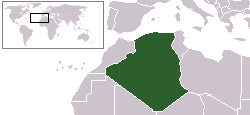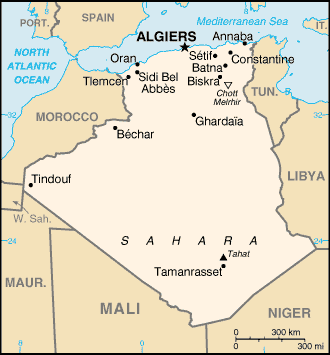Algeria
The People's Democratic Republic of Algeria is a country in northern Africa bordering the Mediterranean Sea in the north, Tunisia in the northeast, Libya in the east, Niger in the southeast, Mali and Mauritania in the southwest, and Morocco in the west (the Moroccan border is closed [1]).
|
|||||
| National motto: None | |||||
 |
|||||
| Official language | Arabic | ||||
| Capital | Algiers | ||||
| President | Abdelaziz Bouteflika | ||||
| Prime Minister | Ahmed Ouyahia | ||||
| Area - Total - % water |
Ranked 11th 2,381,740 km² Negligible |
||||
| Population | Ranked 34th
|
||||
| Independence
|
From France | ||||
| Currency | Algerian dinar | ||||
| Time zone | UTC +1 | ||||
| National anthem | Kassaman | ||||
| Internet TLD | .DZ | ||||
| Calling Code | 213 | ||||
Contents
History
Main article: History of Algeria
The native Berber population of Algeria has been under the rule of foreign occupants for much of the last 3000 years. The Phoenicians (1000 BC) and the Roman Republic (200 BC) were the most important of these, until the coming of the Arabs in the 8th century. However, the flow of conquests was not all one-way; in medieval times the Berber Fatimid dynasty, originating in Algeria, took over Egypt, although it soon afterwards abandoned North Africa.
Algeria was brought into the Ottoman Empire by Khair ad Din and his brother Aruj who made its coast a base for the corsairs; their privateering peaked in Algiers in the 1600s, after which the center of activity moved to Tripoli in Libya. On the pretext of a slight to their consul, the French invaded Algiers in 1830; however, intense resistance from such personalities as Emir Abdelkader made for a slow conquest of Algeria, not technically completed until the early 1900s when the last Tuareg were conquered.
Meanwhile, however, the French had made Algeria an integral part of metropolitan France, a status that would end only with the collapse of the Fourth Republic. Tens of thousands of settlers from France, Italy, Spain, and Malta moved across the Mediterranean to farm the Algerian coastal plain and occupy the most prized parts of Algeria's cities, benefiting from the French government's confiscation of communally held land. People of European descent in Algeria (the so-called pieds-noirs), as well as the native Algerian Jews, were full French citizens starting from the end of the 19th century; by contrast, the vast majority of Muslim Algerians remained outside of French law, and possessed neither French citizenship nor the right to vote. Algeria's social fabric was stretched to breaking point during this period: literacy dropped massively, while land confiscation uprooted much of the population.
In 1954, the National Liberation Front (FLN) launched the guerrilla Algerian War of Independence; after nearly a decade of urban and rural warfare, they succeeded in pushing the French out in 1962. Most of the 1,025,000 pieds-noirs, as well as 91,000 harkis (pro-French Muslim Algerians), or about 10% of the population of Algeria in 1962, fled Algeria for France in just a few months in the middle of that year.
Algeria's first president, the FLN leader Ahmed Ben Bella, was overthrown by his former ally and defense minister, Houari Boumédiènne in 1965. The country then enjoyed almost 25 years of relative stability under the one-party socialism of Boumedienne and his successors.
In the 1990s, Algeria was engulfed in a bloody civil war after the military prevented an Islamist political party, the Islamic Salvation Front from taking power following the country's first multiparty elections. More than 100,000 people were killed, often in unprovoked massacres of civilians, by guerrilla groups such as the Armed Islamic Group.
Politics
Main article: Politics of Algeria
The head of state is the President of the republic, who is elected to a 5-year term, renewable once. Algeria has universal suffrage. The President is the head of the Council of Ministers and of the High Security Council. He appoints the Prime Minister who also is the head of government. The Prime Minister appoints the Council of Ministers.
The Algerian parliament is bicameral, consisting of a lower chamber, the National People's Assembly (APN), with 380 members and an upper chamber, the Council of Nation, with 144 members. The APN is elected every 5 years.
Provinces
Main article: Provinces of Algeria
Algeria is divided into 48 wilayas, or provinces:
Geography
Main article: Geography of Algeria
Most of the coastal area is hilly, sometimes even mountainous, and there are few good harbours. The area just south of the coast, known as the Tell, is fertile. Further south is the Atlas mountain range and the Sahara desert. Algiers, Oran and Constantine are the main cities.
Algeria's climate is arid and hot, although the coastal climate is mild, and the winters in the mountainous areas can be severe. Algeria is prone to sirocco, a hot dust- and sand-laden wind especially common in summer.
Economy
Main article: Economy of Algeria
The hydrocarbons sector is the backbone of the economy, accounting for roughly 60% of budget revenues, 30% of GDP, and over 95% of export earnings. Algeria has the fifth-largest reserves of natural gas in the world and is the second largest gas exporter; it ranks 14th in oil reserves.
Algeria has massive foreign debts. Algeria's financial and economic indicators improved during the mid-1990s, in part because of policy reforms supported by the IMF and debt rescheduling from the Paris Club. Algeria's finances in 2000 and 2001 benefited from the temporary spike in oil prices and the government's tight fiscal policy, leading to a large increase in the trade surplus, record highs in foreign exchange reserves, and reduction in foreign debt. The government's continued efforts to diversify the economy by attracting foreign and domestic investment outside the energy sector has had little success in reducing high unemployment and improving living standards. In 2001, the government signed an Association Treaty with the European Union that will eventually lower tariffs and increase trade.
Demographics
Main article: Demographics of Algeria
About 90% of the Algerians lives in the northern, coastal area, although there are about 1.5 million Bedouin living in the southern desert. The mixed Berber and Arab population is mostly Islamic (99%); other religions are restricted to extremely small groups, mainly of foreigners.
Language
Main article: Languages of Algeria.
The official language is Arabic, spoken natively in dialectal form ("Darja") by some 80% of the population; the other 20% or so speak Berber, officially a national language. French is widely known from schools, but is very rare as a native language.
Culture
Main article: Culture of Algeria
Rai, a locally developed pop music form, has great popularity in Algeria, and enjoys some popularity abroad as well, notably in France, where a large number of Algerians live. More traditional forms include Chaabi music (Algerian folk music), and Andalusi music, the "classical" music of Algeria, descended from the courtly tradition of Moorish Spain.
See also: Music of Algeria, List of Algerian writers
Miscellaneous topics
- Communications in Algeria
- Transportation in Algeria
- Military of Algeria
- Foreign relations of Algeria
- Archeology of Algeria
- List of cities in Algeria
External links
- CIA - The World Factbook -- Algeria - CIA's Factbook on Algeria
- Library of Congress Portals to the World - Algeria
- World History Blog - History of Algeria
- Travel guide to Algeria
Official government websites
- El Mouradia - Official presidential site (in French and Arabic)
- National People's Assembly - Official parliamentary site
References
- Adapted from the Wikipedia article, "Algeria" used under the GNU Free Documentation License
